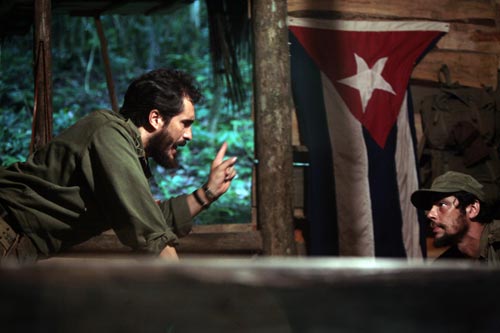
Director Steven Soderbergh has often alternated between big-budget Hollywood flicks (Out of Sight, Ocean’s 11) and smaller, indie fare (Schizopolis, Bubble). Che, his newest film, has elements of both. It has a big star in Benicio del Toro, a sexy topic in the life of Ernesto ‘Che’ Guevara, and an epic scope as Che helps to overthrow the Batista government of Cuba. But it’s also a small movie, as Soderbergh intentionally limits the film’s scale and focuses on the difficulties of creating a revolutionary movement.
This is particularly true in the movie’s second half, which skips ahead to 1966 when Che went to Bolivia in the hopes of replicating the success he had in Cuba. But as Soderbergh methodically shows, the circumstances were different in Bolivia. While the Cuban leftist political parties banded together with Castro and Che’s military movement, the communist party in Bolivia was skeptical and refused to lend support. While the Batista government was largely incompetent in how it ignored the revolution fomenting in the mountains, the Bolivian government, with the help of the CIA, didn’t make the same mistake. And while Che was able to work with a wide variety of charismatic leaders in Cuba, he was largely alone in Bolivia and was never able to create the momentum or sense of inevitability that occurred in the Cuban countryside.




